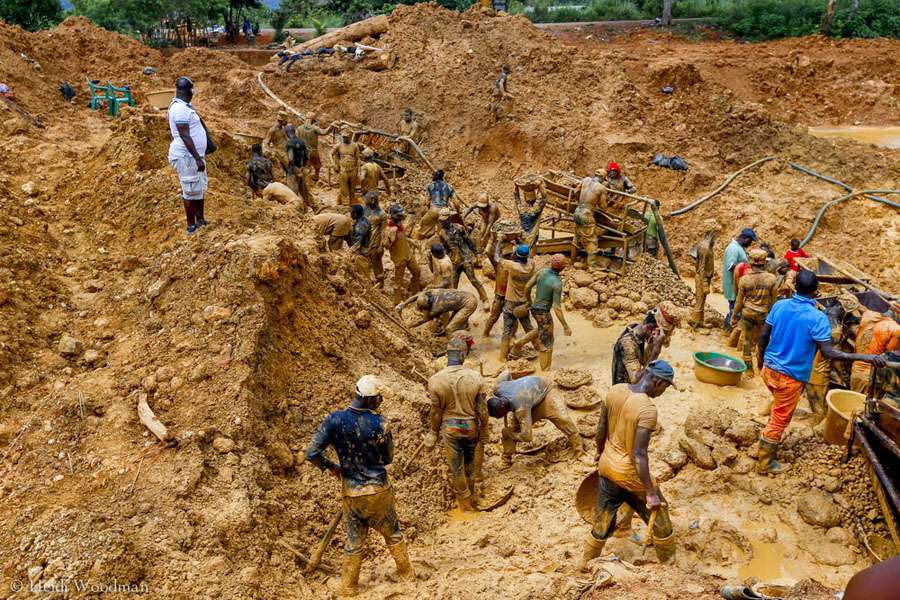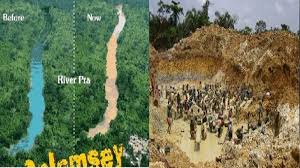THE MENACE OF GALAMSEY AND THE GOVERNMENT’S FIGHT

Galamsey is a word derived from the phrase "gather them and sell", is a local Ghanaian term which means illegal small-scale gold mining in Ghana, West Africa; such workers are known as galamseyers or orpailleurs in neighboring francophone nations. Galamseyers are people who perform illegal gold mining independent of mining companies, digging small working (pits, tunnels and sluices) by hand.
Generally, the galamseyers can dig only to a limited depth, far shallower and smaller than commercial mining companies. Under current Ghana law, it is illegal for galamseyers to dig on land granted to mining companies as concessions or licenses. Most galamseyers find gold in free metallic dust form or they process oxide or sulphide gold or using liquid mercury.
While the practice may have once been tolerated or ignored, local populations are increasingly reporting it. TV and radio shows have been inviting officials to explain their plans to tackle the issue more frequently, and the topic dominates daily news bulletins. Meanwhile, environmental groups recently called on the government to impose a blanket ban on all metal mining.
.jpeg)
China’s gold seekers
Traditionally, small-scale gold mining in Ghana has been carried out by locals on their own land using hand-operated tools. These methods have slowly modernised and expanded, but the recent influx of foreign – predominantly Chinese – miners has accelerated this development. This is despite the fact Ghanaian law prohibits small-scale mining by non-citizens.
Chinese actors have invested substantial funds into mining, introduced more sophisticated technologies, and employed significant numbers of Chinese migrant workers as well as Ghanaians. Their use of heavy machinery has increased both extraction rates and environmental damage.
The Chinese working community is believed to be highly organised and hierarchical, with one kingpin allegedly employing over 300 Chinese migrant workers together with a number of Ghanaians.
Many believe these communities to be hostile to locals, although recent government crackdowns appear to have encouraged co-operation. This is reflected by an increasing number of Ghanaians speaking fluent Mandarin.
Jobs and crime
Galamsey, and the informal communities it creates, is associated with a rise in crime and violence. Police have said that the number of armed robberies has risen in illegal mining areas, often with guns brought in by the Chinese to protect themselves.
Along with the growing presence of weaponry, the trafficking and use of narcotics has also increased.
As profits and goods from galamsey enter the supply chain informally, there is also a high risk that proceeds will be diverted towards other crimes.
Moreover, galamsey can set in motion a vicious circle in terms of employment. Mining often occurs in cocoa farming regions and can lead to the seizure of land and environmental destruction. Both of these outcomes further erode the viability of agriculture, leading to the local population’s deepening dependence on illegal mining for income.
Livelihoods and the law
In its approach, the government has fallen short of issuing a blanket ban on all metal mining activities, legal and illegal. El Salvador became the first country in the world to adopt this strategy in March, and some groups in Ghana have called on the government to follow suit. But officials have made it clear that they are not considering such a move. Instead they say they will support small-scale miners seeking to operate within the law.
With gold mining accounting for around 8% of Ghana’s GDP, a blanket ban would significantly cut into government revenue. It would also be disastrous for those who rely on mining for their livelihoods; these individuals that are often the most vulnerable in society.
Nevertheless, the government’s clampdown on galamsey has affected official gold production rates. The Minister of Lands and Natural Resources suggests this drop means the policies are working, recognising that a significant proportion of Ghana’s gold exports are illegally mined.
In order more comprehensively to assess the efficacy of the government’s new measures, a spokesperson for the Media Coalition Against Galamsey informed the authors that it is hiring an external consultant to compile a report. The spokesperson pointed out that the effects of actions such as the seizure of machinery are typically temporary. Instead of these figures, the spokesperson said that real progress must be measured by rates of land reclamation and levels of enforcements of the ban, aspects on which the report will focus.

.jpeg)
.jpeg) !
!
Tackling galamsey
The problem of galamsey will be very difficult for Ghana to solve. From the centrality of actors from China, one of Ghana’s biggest trade partners; to the importance of small-scale mining in creating jobs in a country suffering from high youth unemployment; to the allegedly close relations between criminal networks and regional police; galamsey is deeply woven into many aspects of Ghana’s current reality.
Tackling the problem will therefore take a range of strategies that must be pursued comprehensively and in a long-term manner. This will be particularly tough for the government.
Nonetheless, the combination of energetic media attention, grassroots campaigns and a host of government policies perhaps provides the best hope for some time that the country can truly tackle galamsey – and, with it, the associated problems of rising crime, lost revenue and environmental destruction.
Congratulations @kwabkesseh! You have completed some achievement on Steemit and have been rewarded with new badge(s) :
Click on any badge to view your own Board of Honor on SteemitBoard.
For more information about SteemitBoard, click here
If you no longer want to receive notifications, reply to this comment with the word
STOP